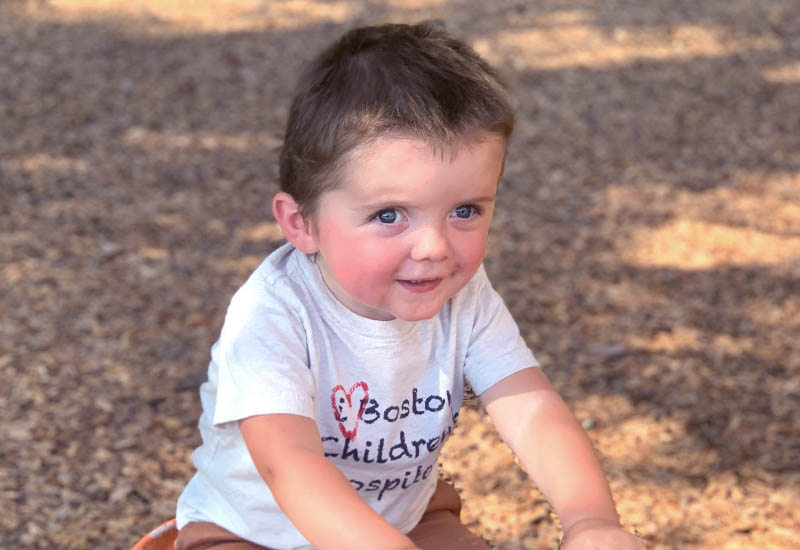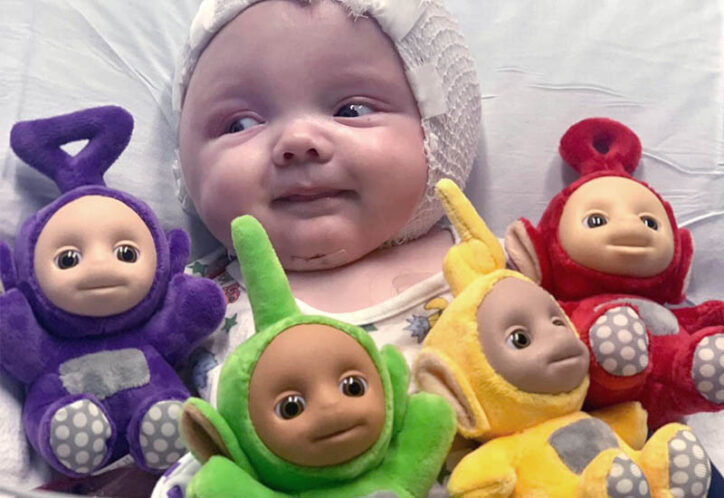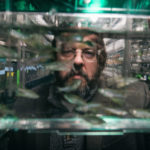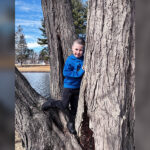There’s no stopping Jack: His journey with craniosynostosis

Jack is almost 2 years old and loves to swim, chase his older sister around the house, and just bring lots of laughs to everyone he meets. For such a happy kid, he’s had an uphill battle to get to this point — starting when he was born.
“Something wasn’t right with the shape of Jack’s head,” remembers his mother, Angela. When Jack was just 2 months old, Angela and her husband noticed that his head wasn’t round and the front of his skull bulged.
At first, they assumed it was related to a difficult delivery, with doctors resorting to vacuum extraction, in which a suction cup is placed on the baby’s head to guide them through the birth canal. During delivery, doctors couldn’t get the suction cup to the top of Jack’s head, so they attached it to his forehead. “They suctioned him three times to get him out — that left a hematoma on the front of his head,” Angela explains. “But when we visited his pediatrician, his doctor just knew that there was a bigger problem.”
Getting a little help from friends
After being examined by his pediatrician and then a neurosurgeon in his home state of Florida, Jack was diagnosed with craniosynostosis, a condition in which the fibrous connections between the bones of the skull, called sutures, grow together too early during development. After a difficult appointment at a local hospital, Angela knew that she needed to find answers elsewhere. Fueled with determination to get proper care for Jack, she began emailing colleagues to see if they knew where the top treatment centers in the United States were.
“Within 48 hours, I was directed to Boston Children’s Cleft and Craniofacial Center and to Dr. John Meara and Dr. Mark Proctor,” shares Angela. “Once we made it up to Boston, we knew that Jack would be in great hands — we couldn’t have felt luckier.”
Facing and overcoming challenges
Once in Boston, Angela learned that all but one of the sutures on Jack’s skull had already closed — the bilateral lambdoid, the coronal, and the sagittal. “It could have been a very dangerous situation if we didn’t get to Boston Children’s when we did,” Angela says. If untreated, pressure could build up in the skull, leading to potential problems such as blindness, seizures, or brain damage. “Getting Jack in for surgery when we did was a blessing.”
After his first surgery with Drs. Proctor and Meara, Jack wore a helmet for about a year to help correct the shape of his skull. Trying to navigate proper post-surgical care can be a challenge, but Angela explains that Boston Children’s took care of everything for her and Jack. “The care team was phenomenal — they coordinated the right programs for Jack when we returned home to Florida. This made the follow-up visits incredibly easy and allowed for Jack’s reports to be sent back up to Boston for his team to review.” Samantha Hall, Dr. Proctor’s assistant, was instrumental in coordinating Jack’s care back home in Florida.
In December 2021, a routine scan picked up early signs of papilledema, a condition in which increased pressure in or around the brain causes part of the optic nerve to swell. As a result, Jack made another trip to Boston for a fronto-orbital advancement, a surgical procedure that helps expand the space inside the skull and reshape the forehead and upper part of the eye socket.
The surgery went well, and Jack is now on the road to recovery, with a yearly follow-up scheduled and neuro-ophthalmologic appointments every three months to check for papilledema, which could indicate re-fusion of his sutures and raised intracranial pressure. “He grows bone like no other kid!” laughs Angela.

Advice from a mom who’s been there
After experiencing a whirlwind of appointments and and travel for Jack’s medical care, Angela has key advice for parents who are experiencing similar challenges.
Stay determined. Angela felt overwhelmed by Jack’s initial diagnosis, but she knew her experiences in Tampa wouldn’t be the end of Jack’s journey to recovery. “Keep reaching out to everyone — really lean into social media and never be afraid to keep asking everyone you know if they know anything about the diagnosis. Utilize every resource that you can get your hands on to get to the best treatment.”
Travel is worth it. When she first arrived in Boston, Angela was impressed by how Boston Children’s took such empathetic care of her family during this stressful time. “From the minute you walk in the door, everyone is really all about your family. That’s something that’s so vital when your child has a serious medical condition.”
Angela explains that Dr. Proctor, Dr. Meara, and their team provided easy-to-understand explanations for everything happening with Jack — something she believes made his care even more impactful. “I could easily jump in and ask more in-depth questions.”
Expert care matters. A common side effect of a fronto-orbital advancement is swelling and bruising around the eyes, but the skill and precision of the surgeons who performed Jack’s procedure allowed for minimal bruising around his eye sockets — enabling a speedy recovery and lots of relief for his mom and dad.
Jack’s nickname in the hospital was “Happy Chappy” because he was always smiling and full of energy. Today, he’s still smiling — and focused on being a silly little brother to his older sister and riding his scooter. According to Angela, thanks to the care at Boston Children’s, “nothing stopped him even when he had the helmet — and I don’t see him stopping anytime soon.”
Visit the Cleft and Craniofacial Center for more information.
Related Posts :
-

Minimally invasive surgery safe and effective for craniosynostosis
Traditional treatment for children with craniosynostosis — a condition in which the bones of the skull grow together too early in ...
-

Diving deep: Understanding skeletal conditions with fish models
From fragile ice fish deep in the Antarctic Ocean to flying fish gliding above the Caribbean sea, fish have evolved ...
-

A kiss from their sister: A family’s journey with cleft lip care
Kelly and Ben’s experience with cleft lip care at Boston Children’s Hospital spans multiple years and multiple children. ...
-

Miles for Jack: Robin sequence and the bond between a family and doctor
For runners and non-runners alike, next week’s Boston Marathon is extra special. It marks a beloved tradition for the ...





